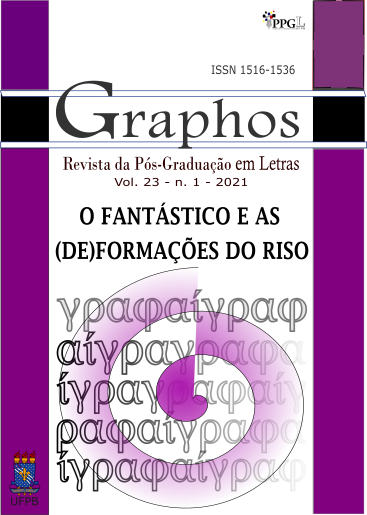Vol. 23 No. 1 (2021): The fantastic and the (de)formation of laughter

This dossier is about the fantastic and its interfaces with laughter, which extends more widely to caricature, grotesque, hyperbole, comic, burlesque, irony, satire, parody and other related forms that produce the distortion of laughter in fantastic narratives. Papers that dialogue with other languages, such as cinema, comic, photography and painting are also welcome, as long as they follow the proposed theme.
The multiple theoretical aspects of the fantastic – from the first effective systematizations by Tzvetan Todorov (1970), through Irène Bessière (1974), until the reflections of David Roas (2014) – have allowed an understanding of how this literary mode relates in different ways, either in terms of content or form, to literary aesthetic phenomena such as the wonderful, the strange, the fantasy, the grotesque and the absurd. We must say that the last two, not seldom, flow into laughter; but to what extent can humor manifest itself in fantastic narratives?
In 1940, the French poet André Breton published L'humour noir, showing interest in a kind of tragic comicality that focused on resistance and criticism of social conventions. Breton’s anthology included writers directly associated with the fantastic, such as Franz Kafka, Villiers de L'Isle-Adam, Charles Baudelaire, Edgar Allan Poe, among others. Poe's critical fortune, for example, includes a significant list of studies that encompass satire, parody, irony and "diabolical humor", which is present throughout his work. Recently, the Publishing House 34 edited Antologia do humor russo (2019), organized by Arlete Cavaliere. In its preface, Cavaliere points out that the hue of laughter in Russian literature is "irreverent and critical (...) unsubmissive and challenging" (p. 9). It is precisely this tone of comedy that is present in classic Russian fantastic narratives, and their fullness is achieved by Gógol, in "The nose" (1836) and by Dostoiévski, in The double (1846). In another perspective, Georges Desmeules (1997) highlights this discussion when he refers to laughter as a hidden facet of fantastic narrative. For him, humor is an ambiguous reality from which both comic and tragic can emerge.






